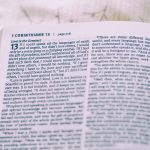You know it’s a new year when every commercial on TV is an ad for either gym memberships or diet supplements. Then, of course, there are all the magazines whose covers are littered with ideas and products for organizing the home. Office supply stores are stocked with calendars and systems to keep schedules on track and organized. And everyone is talking about their goals and resolutions for the year.
I’ve made many resolutions over the years. There was the time I resolved to cut out caffeine (it didn’t last). Another year I decided I wanted to develop a green thumb (I didn’t). One year I resolved to write more poetry (only a handful was produced). Then there was the year I decided I wanted to read all the works of C. S. Lewis, until I discovered just how many books he actually wrote!
In all seriousness, it’s a good thing to set goals and work toward them. We ought to be purposeful, intentional, and determined in the way we live. We don’t want to waste a second of the brief time God grants us on this earth. The apostle Paul spoke of his own work toward his life’s goal in Philippians 3:12-14:
Not that I have already obtained this or am already perfect, but I press on to make it my own, because Christ Jesus has made me his own. Brothers, I do not consider that I have made it my own. But one thing I do: forgetting what lies behind and straining forward to what lies ahead, I press on toward the goal for the prize of the upward call of God in Christ Jesus.
When it comes to resolutions, perhaps the best list I’ve ever read were written by Jonathan Edwards when he was a late teenager. Edwards, the 18th-century New England Puritan preacher, is most famous for his involvement in the First Great Awakening and for his sermon “Sinners in the Hands of an Angry God.” But before he became the famous preacher and theologian, he wrote a list of 70 life resolutions. These resolutions cover broad areas of life from time management to relationships; from spiritual growth to eating; from how he faced suffering to his devotional habits. We can all learn from this list, especially as we start a new year and consider making our own resolutions.
Here is just a sampling of his resolutions (taken from the excellent book The Unwavering Resolve of Jonathan Edwards by Steven J. Lawson):
#7: Resolved, never to do anything, which I should be afraid to do, if it were the last hour of my life.
#25: Resolved, to examine carefully, and constantly, what that one thing in me is, which causes me in the least to doubt of the love of God; and to direct all my forces against it.
#58: Resolved, not only to refrain from an air of dislike, fretfulness, and anger in conversation, but to exhibit an air of love, cheerfulness, and benignity.
#67: Resolved, after afflictions, to inquire, what I am the better for them, what good I have got by them, and what I might have got by them.
Three Elements
If you are considering your own resolutions for this year, there are at least three elements to Jonathan Edwards’s resolutions we can use in developing our own.
1. Edwards pursued God’s glory. The Westminster Shorter Catechism tells us that our purpose in life is to glorify God and enjoy him forever. Edwards’s life resolutions reflect this purpose. Item number four on his list perhaps puts it best: “Resolved, never to do any manner of thing, whether in soul or body, less or more, but what tends to the glory of God; nor be, nor suffer it, if I can avoid it.” May all our resolutions begin with and be founded on this goal as well.
2. They were life resolutions, not temporary ones. The resolutions Edwards made were not like the kind we make where we give up on them by February 1. Rather, his resolutions were lifetime goals. These were resolutions that he shaped his life around and by which he measured himself. He kept regular track of his progress, journaling about his struggles and progress along the way. He reviewed his progress on a regular basis, weekly, monthly, and yearly.
3. He drew from God’s strength. These words precede his list of resolutions: “Being sensible that I am unable to do anything without God’s help, I do humbly entreat him by his grace to enable me to keep these Resolutions, so far as they are agreeable to his will, for Christ’s sake.” Edwards knew that he depended upon God’s grace for all things, including his growth in holiness. No amount of resolve and no matter how good our intentions, we cannot do anything apart from the grace of God at work in us. Whatever our goals and resolutions, we must humbly depend upon Christ and rely on his grace to enable us.
If you are making resolutions for yourself this year, consider reading those of Jonathan Edwards. You can find a complete list of the 70 resolutions here.
Is there enough evidence for us to believe the Gospels?
 In an age of faith deconstruction and skepticism about the Bible’s authority, it’s common to hear claims that the Gospels are unreliable propaganda. And if the Gospels are shown to be historically unreliable, the whole foundation of Christianity begins to crumble.
In an age of faith deconstruction and skepticism about the Bible’s authority, it’s common to hear claims that the Gospels are unreliable propaganda. And if the Gospels are shown to be historically unreliable, the whole foundation of Christianity begins to crumble.



































